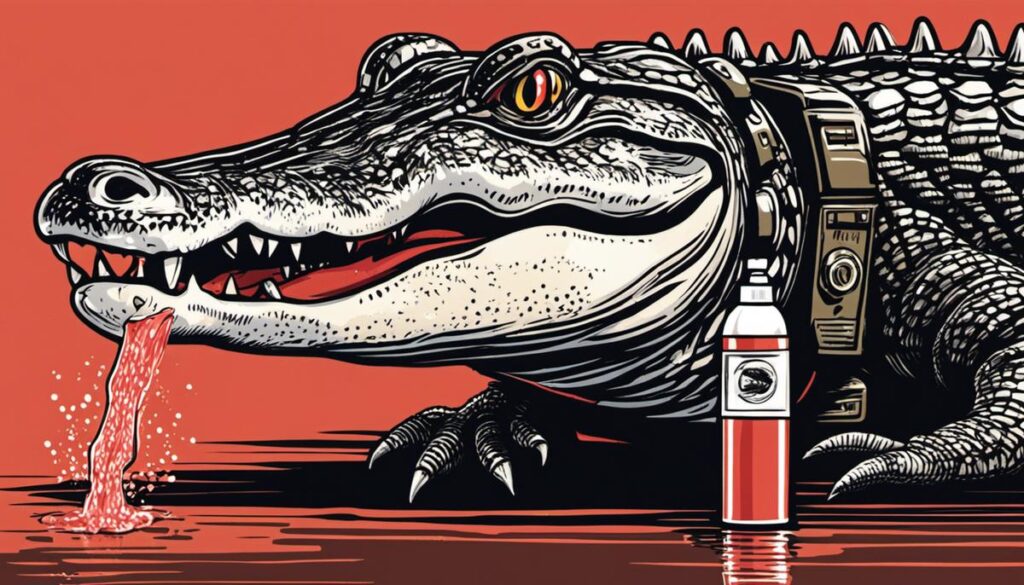Alligators, formidable creatures with their reptilian strength and stealth, have long been a source of fascination and fear. Both residents and visitors in areas with high alligator populations may wonder about the effectiveness of personal defense measures, such as pepper spray, against these potentially dangerous animals. The complexities of this question lie deeply rooted in the biology of alligators, their sensory abilities, and how these may interact with the chemical compounds present in pepper spray. Shining a light on these elements can help reveal the efficacy of pepper spray as a deterrence method and the potential consequences of its use on alligators.
The Biology of Alligators
Understanding Alligator Biology and Sensory Capabilities
Alligators – members of the crocodilian family – are known for their resilience and predatory aptitude. Yet, their biological framework and functioning of sensory organs present crucial elements of understanding in evaluating the potential of pepper spray to deter them.
 Alligators possess superior sensory capabilities that are fine-tuned for survival in their natural habitats. Their eyes, adapted to nocturnal hunting, offer exceptional night vision. Additionally, alligators have a nictitating membrane that can shield the eye, permitting them to see underwater while protecting the eye from potential harm.
Alligators possess superior sensory capabilities that are fine-tuned for survival in their natural habitats. Their eyes, adapted to nocturnal hunting, offer exceptional night vision. Additionally, alligators have a nictitating membrane that can shield the eye, permitting them to see underwater while protecting the eye from potential harm.
However, an alligator’s olfactory sense is perhaps its most formidable sensory asset. They possess a keen sense of smell, assisting them in locating food from afar. The alligator’s nostrils, located at the end of its snout, can close off while the animal dives, preventing water from entering its nose. Despite these adaptations, their sensory array does not include a known capacity to cope with chemical irritants.
As cold-blooded reptiles, alligators have lower metabolic rates that give them remarkable survival abilities. They can live in a range of water temperatures and can slow their metabolism in colder weather or when food is scarce. Such physiological adaptability could potentially impact the effectiveness of substances like pepper spray.
Pepper Spray’s Effectiveness on Alligators

Pepper spray, originally designed to deter human attackers, is a lachrymatory agent. It temporarily incapacitates an assailant by inducing tears, pain, and even temporary blindness. The active ingredient in pepper spray, oleoresin capsicum (OC), is derived from chili peppers and works as an inflammatory agent.
However, the effectiveness of pepper spray on alligators is heavily disputed. The biology of an alligator – specifically its eyes and nose structure – is significantly dissimilar from humans. They are naturally designed to tolerate chemical substances in water, potentially affecting the efficiency of pepper spray.
Moreover, reptiles innately have a lesser sensitivity to capsaicin, the component that elicits the burning sensation in mammals. This has led some experts to surmise that the impact of typical pepper spray on an alligator would be minimal if there’s any impact at all.
Additionally, a direct hit of pepper spray in an alligator’s eyes—while hypothetically could cause discomfort—may be challenging to achieve in reality, given their ability to protect their eyes swiftly with a nictitating membrane.
Hence, the use of pepper spray as a defense mechanism against alligators is questionable. While it theoretically might cause the creature some discomfort, it is unlikely to provide a significant deterrent against an aggressive alligator.
Interacting Safely with Alligators
When it comes to ensuring safety around alligators, caution and avoidance are key. Alligator habitats should be kept at a distance, especially during mating season when alligators are known to display more aggressive behavior. If one accidentally stumbles upon an alligator, experts suggest retreating calmly and slowly as abrupt movements or attempts to run could ignite their predatory instincts. Furthermore, feeding alligators is highly unfavorable as it conditions them to associate humans with food.
Despite taking these safety measures, in circumstances where an alligator still poses a threat, it is best to alert local wildlife authorities instead of taking matters into one’s own hands by wielding self-defense tools such as pepper spray.

Potential Risks and Legal Considerations
Probable Dangers of Pepper Spray Use on Alligators
Alligators are generally timid around humans unless provoked. The application of pepper spray could possibly escalate their aggression. This pain-induced defense response might make an alligator more prone to attack.
There is also a potential health hazard for the alligator associated with the use of pepper spray. The spray contains oleoresin capsicum, an oil found in hot peppers that induces a burning effect. Despite its impact on alligators remaining ambiguous and understudied, it is conjectured that the spray could inflict harm to the alligator’s eyes or respiratory system.
Legal Considerations for Using Pepper Spray on Alligators
Alligators are protected by law in many U.S. states, especially those where they are native. As a result, abusing or harassing them, including using irritants like pepper spray, could be considered illegal.
For example, in Florida, it is against the law to “annoy, molest, harass, or disturb any alligator”. Violation of this provision can result in fines up to $500, and 60 days in jail. Importantly, this law holds even if one’s intention was self-defense.
Similarly, alligators are protected under federal law by the U.S. Fish and Wildlife Service. The Alligator Lacey Act makes it unlawful to import, export, sell, receive, acquire, or purchase any alligator specimen or product without appropriate documentation and compliance with federal and state laws.
In essence, utilizing pepper spray as a means to ward off alligators is not a recommended practice. The risks associated with such an action considerably surpass any presumed advantages, and there can be stern legal repercussions. Should you find yourself crossing paths with an alligator, it’s best to retreat slowly and alert local wildlife authorities if the alligator presents a potential threat to human safety.
Final Words
Engaging with the world of wildlife demands respect and understanding. As we explore the possibilities of using pepper spray as a defensive method against alligators, it is important to underscore the necessity of a science-based approach, taking into account potential risks and the ethical implications surrounding this practice. Furthermore, exploring alternatives to chemical irritants can open doorways to more humane and non-disruptive solutions for peacefully co-existing with these incredible creatures. Regardless of the measures we choose to employ, the goal should always be directed towards a responsible and harmonious relationship with nature.
ALSO READ: Does Pepper Spray Work On Bears?
Bliss Ferdinand is a resilient single mother and the founder of pepperspraymum.com, a blog dedicated to empowering women and promoting personal safety. With a passion for self-defense, Bliss shares her knowledge and experiences to help other mothers protect themselves and their families. Through her blog, she educates her readers about the effective use of pepper sprays, offering valuable insights, product reviews, and practical tips on staying safe in various situations. Bliss’s commitment to her community has inspired many women to take charge of their own security, making pepperspraymum.com a go-to resource for those seeking practical advice and peace of mind


